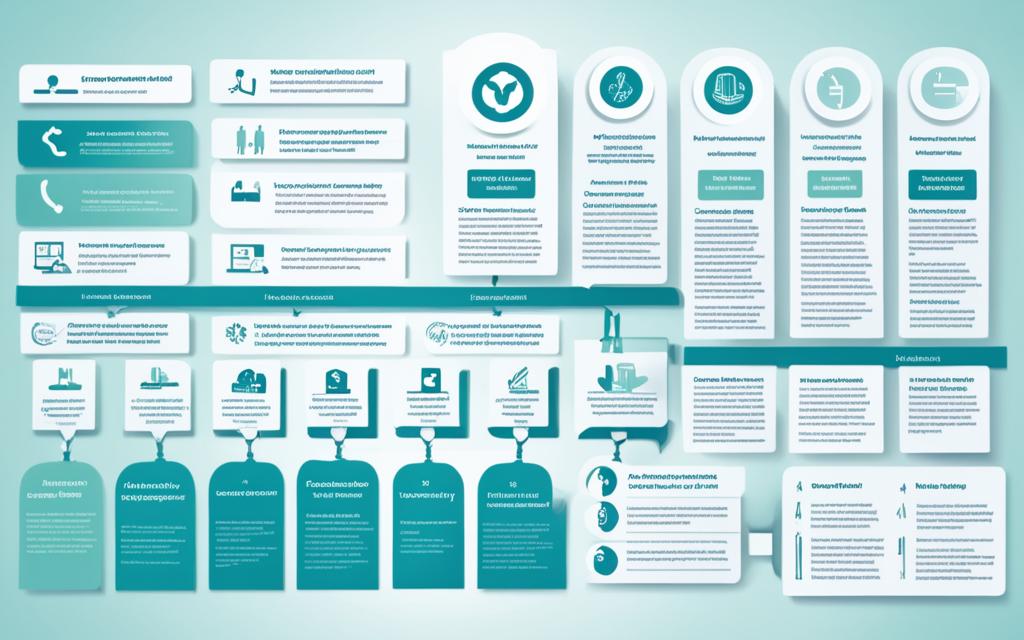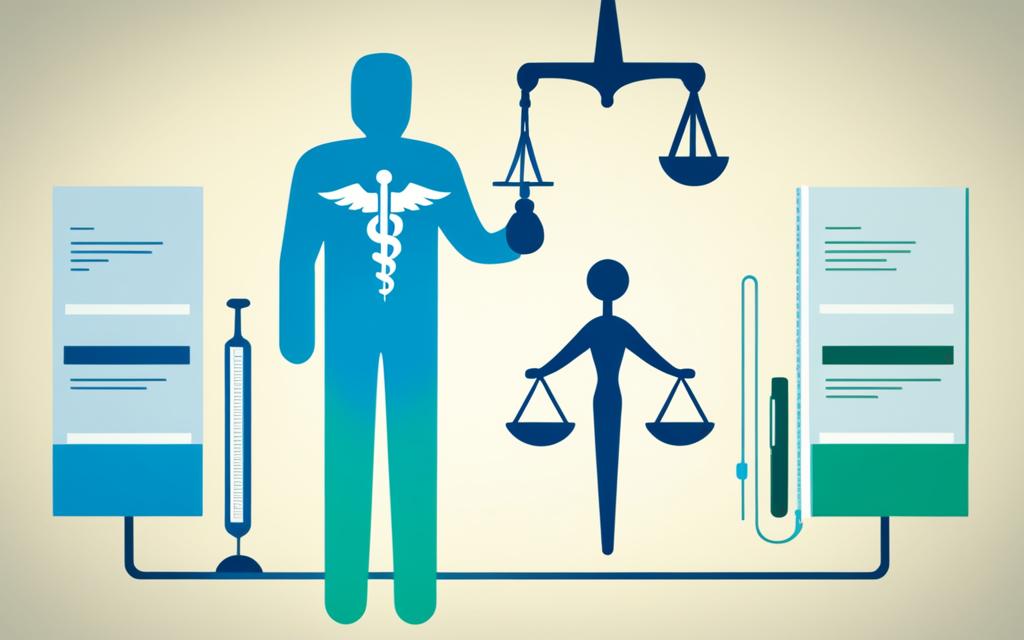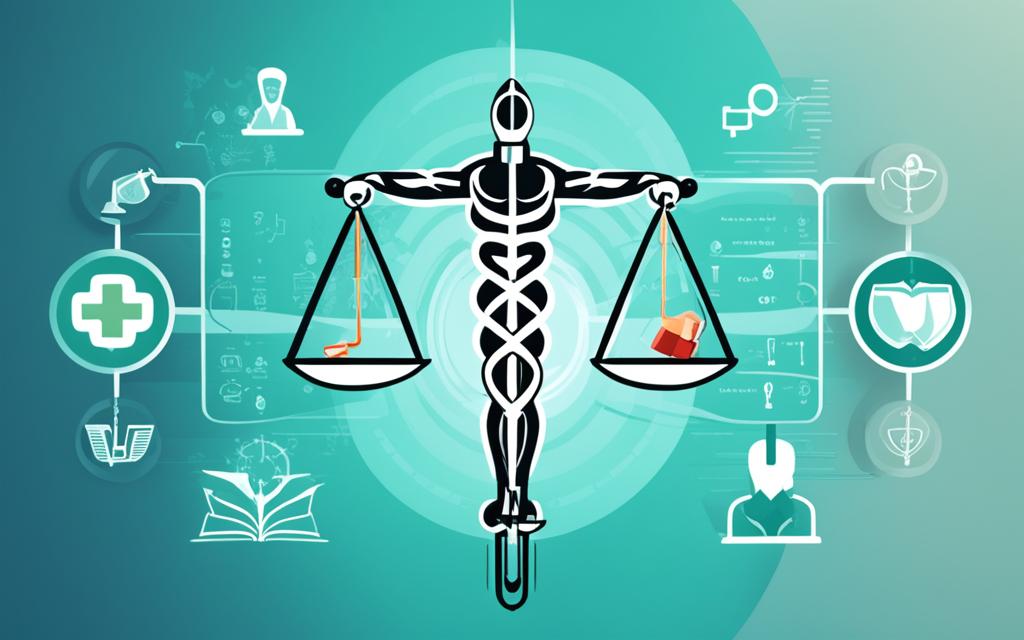The healthcare industry is a complex and highly regulated landscape, where the intersection of medical practice, patient rights, and governmental oversight demands a keen understanding of the legal principles involved. Health law is a multidisciplinary field that focuses on the regulations and policies governing the healthcare industry, both in government settings and the private sector. This area of law affects legal issues related to medical providers, health insurers, patients, and government agencies, addressing a wide range of issues, including medical malpractice, Medicare, Medicaid, the HIPAA Privacy Rule, and even estate planning documents.
Key Takeaways
- Health law is a multidisciplinary field that governs the healthcare industry, covering a wide range of legal issues.
- This area of law affects medical providers, health insurers, patients, and government agencies.
- Key areas of focus include medical malpractice, Medicare, Medicaid, HIPAA, and estate planning.
- Understanding the legal aspects of healthcare is crucial for ensuring compliance and protecting patient rights.
- Healthcare organizations must navigate a complex array of regulations to maintain ethical and lawful practices.
Understanding Health Law and Its Significance
Health law is a multidisciplinary field that focuses on the regulations and policies governing the healthcare industry and healthcare itself in government settings as well as the private sector. This area of law affects legal issues related to medical providers, health insurers, patients, and government agencies, and it addresses a wide range of issues including medical malpractice, Medicare, Medicaid, the HIPAA Privacy Rule, and even estate planning documents.
What is Health Law?
Health law is the legal framework that governs the healthcare industry, encompassing the rights, responsibilities, and regulations that apply to healthcare providers, patients, and the overall healthcare system. It encompasses a diverse range of legal disciplines, including medical malpractice, healthcare compliance, public health regulations, and the administration of government healthcare programs like Medicare and Medicaid.
The Importance of Health Law
Health law plays a crucial role in ensuring the quality, safety, and integrity of the healthcare system. By establishing standards, protecting patient rights, and regulating healthcare organizations and providers, health law helps to uphold the principles of ethical and responsible medical practice. It also serves to address emerging challenges, such as the integration of new technologies and the evolving landscape of healthcare financing and delivery.
Health Law’s Impact on the Healthcare Industry
The healthcare industry is subject to a complex web of laws and regulations that impact every aspect of its operations. Health law influences the way healthcare providers deliver care, how patients access and pay for services, and how government agencies and private insurers oversee the industry. Understanding and complying with these legal frameworks is essential for healthcare organizations to operate effectively and avoid costly liabilities or penalties.
Key Components of Health Care Law
As we navigate the complex landscape of the healthcare industry, it’s crucial to understand the key legal components that shape its operations. Among the most significant elements of health care law are the Health Insurance Portability and Accountability Act (HIPAA), the Affordable Care Act (ACA), and the regulations surrounding Medicare, Medicaid, and Anti-Kickback Statutes.
The Health Insurance Portability and Accountability Act (HIPAA)
The HIPAA is a comprehensive federal law that establishes standards for the protection of sensitive patient health information, known as protected health information (PHI). This landmark legislation ensures that patient privacy is maintained and that healthcare providers and organizations adhere to strict compliance measures when handling and storing patient data.
The Affordable Care Act (ACA)
The Affordable Care Act (ACA), also known as Obamacare, is a transformative healthcare reform law that has had a significant impact on the healthcare industry. The ACA aims to improve access to healthcare, enhance patient protections, and promote healthcare compliance through a range of provisions, including the individual mandate, the expansion of Medicaid, and the creation of healthcare exchanges.
Medicare, Medicaid, and Anti-Kickback Statutes
The Medicare and Medicaid programs are government-funded healthcare initiatives that provide coverage for specific populations, such as the elderly, disabled, and low-income individuals. These programs are subject to a complex set of regulations, including the Anti-Kickback Statute, which prohibits the exchange of remuneration for referrals of items or services covered by federal healthcare programs. Healthcare providers must navigate these healthcare regulations carefully to ensure compliance and avoid potential legal issues.
| Key Component | Description | Relevance |
|---|---|---|
| HIPAA | Federal law that establishes standards for the protection of sensitive patient health information (PHI) | Ensures patient privacy and healthcare compliance |
| Affordable Care Act (ACA) | Healthcare reform law that aims to improve access to healthcare, enhance patient protections, and promote healthcare compliance | Transformative impact on the healthcare industry |
| Medicare, Medicaid, and Anti-Kickback Statutes | Government-funded healthcare programs and related regulations, including the Anti-Kickback Statute | Complex healthcare regulations that healthcare providers must navigate to ensure compliance |

The Role of Health Care Lawyers
Health care lawyers play a crucial role in the healthcare industry, providing legal advice and representation to a wide range of clients, including healthcare providers, hospitals, insurance companies, and government agencies. These specialists in health law are well-versed in the various regulations that govern the healthcare sector, helping their clients navigate the complex and ever-changing regulatory landscape.
Advising on Regulatory Compliance
One of the primary responsibilities of healthcare lawyers is to ensure their clients maintain compliance with the numerous laws and regulations that govern the healthcare industry. This includes advising on issues related to patient privacy, data security, and the Health Insurance Portability and Accountability Act (HIPAA). These lawyers work closely with their healthcare clients to develop and implement robust compliance programs, helping them avoid costly penalties and maintain the trust of their patients.
Handling Medical Malpractice Claims
When patients suffer harm due to medical negligence or substandard care, healthcare lawyers play a crucial role in representing either the healthcare provider or the patient in medical malpractice claims. These lawyers are well-versed in the complex legal and medical issues surrounding malpractice, and they work tirelessly to protect the rights and interests of their clients.
Negotiating Contracts and Intellectual Property Issues
Healthcare lawyers also play a significant role in the business aspects of the healthcare industry, negotiating contracts and addressing intellectual property concerns. This may include drafting and reviewing agreements with vendors, suppliers, and other healthcare organizations, as well as protecting the intellectual property rights of their clients, such as new medical technologies or innovative treatments.
Legal Aspects of Healthcare
Healthcare law is a complex and multifaceted field that encompasses a wide range of legal issues, from medical malpractice and informed consent to health insurance and coverage disputes. As patients seek quality care and healthcare providers strive to deliver it, navigating the legal landscape is crucial for ensuring the integrity and safety of the healthcare system.
Medical Malpractice and Informed Consent
Medical malpractice is a significant area of healthcare law that involves claims of serious medical negligence made by patients against healthcare providers. Healthcare lawyers play a vital role in representing clients in cases where individuals have suffered harm due to substandard care or a failure to obtain informed consent for treatment. Ensuring that patients are fully informed of the risks, benefits, and alternatives to any medical procedure is a critical part of upholding patient rights and maintaining the highest standards of care.
Health Insurance and Coverage Disputes
In addition to medical malpractice and informed consent, healthcare law also addresses complex issues surrounding health insurance and coverage disputes. Healthcare lawyers work with patients, insurance providers, and healthcare organizations to navigate the intricate web of regulations and policies that govern the healthcare industry. From resolving disputes over coverage for specific treatments to ensuring compliance with the Affordable Care Act, these legal professionals play a vital role in protecting the patient rights and ensuring access to essential healthcare services.

Protecting Patient Rights and Provider Responsibilities
In the healthcare industry, the legal framework plays a crucial role in safeguarding the rights of patients and defining the responsibilities of healthcare providers. As we navigate the complex landscape of healthcare regulations, it is essential to understand the delicate balance between patient rights and provider obligations.
Patient Rights to Quality Care and Privacy
Patients have the fundamental right to receive high-quality medical care that meets the established standards of the healthcare profession. This includes the right to accurate diagnosis, appropriate treatment, and effective communication with their healthcare providers. Additionally, patients have the right to expect their personal and medical information to be kept confidential, in accordance with the Health Insurance Portability and Accountability Act (HIPAA) and other patient privacy laws.
Provider Responsibilities and Regulatory Compliance
Healthcare providers, including physicians, nurses, and medical facilities, have a legal and ethical duty to uphold the rights of their patients. This means adhering to healthcare regulations, maintaining professional standards of care, and ensuring patient privacy and confidentiality. Providers must also remain vigilant in their compliance efforts, staying up-to-date with the latest healthcare laws and regulations to safeguard the quality of care and protect patient rights.
By working together, patients and healthcare providers can foster a collaborative and trustworthy relationship, where the rights of patients are respected, and the responsibilities of providers are upheld. This mutual understanding and commitment to healthcare compliance and quality of care are essential for maintaining a robust and equitable healthcare system.
The Role of Government Agencies and Regulations
Health law plays a vital role for healthcare lawyers and in shaping government policies related to the healthcare industry. As healthcare professionals, we work closely with government healthcare agencies to develop, implement, and enforce laws that protect patients, ensure access to quality health services, and promote public health.
Developing and Enforcing Healthcare Laws
Healthcare lawyers collaborate with agencies like the Department of Health and Human Services (HHS), the Centers for Medicare and Medicaid Services (CMS), and the Food and Drug Administration (FDA) to create and enforce regulations that govern the healthcare sector. These agencies are responsible for drafting and implementing laws that address patient privacy, medical malpractice, fraud and abuse, and other critical healthcare issues.
Ensuring Access to Health Services
One of the primary goals of government healthcare agencies is to ensure that all individuals have access to essential health services, regardless of their socioeconomic status or location. Healthcare lawyers work with these agencies to develop policies and programs that expand coverage, improve affordability, and remove barriers to care, such as those related to healthcare regulations and public health initiatives.
Promoting Public Health
Government healthcare agencies also play a crucial role in promoting public health and preventing the spread of diseases. Healthcare lawyers collaborate with these agencies to create and enforce laws and regulations that address issues like disease prevention, environmental health, and emergency preparedness. This helps to ensure that our communities have the resources and support they need to maintain optimal public health.

Healthcare Compliance: Strategies and Challenges
As healthcare organizations, such as hospitals, nursing homes, and medical practices, navigate the complex regulatory landscape, ensuring healthcare compliance has become a top priority. Healthcare lawyers play a crucial role in helping these organizations address the various legal and ethical considerations that come with delivering quality patient care while adhering to strict regulatory compliance requirements.
Building an Effective Compliance Program
One of the primary responsibilities of healthcare lawyers is to assist in developing and implementing a robust compliance program. This involves drafting and reviewing contracts, advising on regulatory compliance and payment issues, and providing guidance on matters such as patient privacy, informed consent, and health insurance requirements. By staying abreast of the ever-evolving healthcare regulations, these lawyers help organizations mitigate risks and ensure they operate within the bounds of the law.
Addressing Fraud and Abuse
Healthcare lawyers also play a pivotal role in helping organizations address fraud and abuse concerns. They work closely with clients to develop and implement robust policies and procedures to detect, prevent, and respond to potential instances of fraudulent or abusive practices. This includes guidance on complex healthcare regulations related to billing, coding, and financial arrangements, ensuring the organization maintains the highest standards of regulatory compliance.
Navigating Complex Regulations
The healthcare industry is subject to a vast array of complex healthcare regulations, which can be challenging for organizations to navigate. Healthcare lawyers play a vital role in interpreting these regulations and providing tailored guidance to ensure their clients remain in full compliance. From advising on issues related to patient privacy and data security to guiding organizations through regulatory changes and enforcement actions, these legal professionals help their clients stay ahead of the curve and maintain their commitment to ethical and responsible healthcare practices.
The Future of Health Law
As the healthcare landscape continues to evolve, health law will play a pivotal role in addressing the emerging challenges and opportunities that lie ahead. Health care lawyers will need to navigate a range of complex issues, including the ongoing implementation of the Affordable Care Act, the integration of cutting-edge healthcare technologies, and the changing dynamics of the global health insurance market.
Emerging Challenges and Opportunities
The future of healthcare law will be shaped by a variety of emerging issues, such as the increasing demand for telemedicine and the need to address global public health concerns. Health care lawyers will be instrumental in helping healthcare organizations and providers adapt to these changes, ensuring compliance with evolving healthcare regulations and protecting the rights of patients in the face of emerging healthcare challenges.
The Role of Technology and Telemedicine
The rapid advancements in healthcare technology will significantly impact the future of health law. Health care lawyers will be tasked with navigating the legal implications of telemedicine, data privacy, and the integration of new digital tools into the healthcare ecosystem. They will play a crucial role in shaping the regulatory frameworks that will govern the use of these emerging technologies, ensuring that patients’ rights and safety remain at the forefront.
International Health Law and Global Public Health
As the world becomes increasingly interconnected, international health law will become an increasingly important area of focus for health care lawyers. They will need to address cross-border healthcare issues, such as the regulation of medical tourism and the coordination of global public health initiatives. By navigating the complex web of international regulations and treaties, health care lawyers will be instrumental in promoting equitable access to healthcare and strengthening global public health policies.

Conclusion
As we have explored, the role of law in healthcare is paramount in ensuring the quality, safety, and integrity of the healthcare system. Healthcare law encompasses a vast array of legal issues, from medical malpractice and informed consent to healthcare compliance and fraud prevention. Healthcare lawyers play a vital role in navigating the complex web of healthcare regulations, advocating for patient rights, and helping healthcare organizations and providers meet their legal and ethical obligations.
Throughout this article, we have delved into the legal aspects of healthcare, examining the key components of health law, the responsibilities of healthcare lawyers, and the critical role of government agencies and regulations. We have also discussed the importance of healthcare compliance and the ongoing challenges and opportunities that lie ahead for this dynamic field.
As the healthcare industry continues to evolve, the significance of healthcare law will only grow. By staying informed and proactive, healthcare professionals, patients, and policymakers can work together to ensure that the legal framework governing healthcare remains responsive, effective, and aligned with the needs of all stakeholders. Together, we can build a healthcare system that is not only legally compliant but also ethically sound and focused on delivering the highest quality of care to all.
